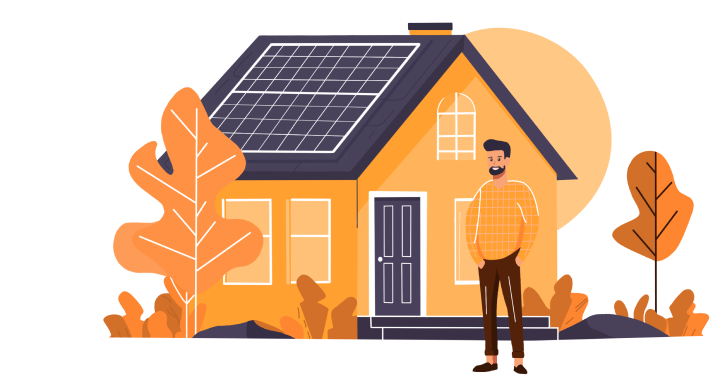Are you considering the switch to solar energy but unsure about the complexities of installation? The decision to install solar panels on roof tops is a significant step towards sustainable living.
Solar Energy Host is here to clear up the process for you, breaking down costs, assessing your roof's suitability and highlighting potential energy savings. With us, you gain more than just energy independence—you're also investing in a cleaner, greener future for your home.
Read on for more information about solar installers and the installation process.
Step #1: Assess your roof's suitability.
The orientation and angle of your roof
First things first, the direction and tilt of your roof matter a lot when it comes to roof panels installation. Ideal orientations vary by location. For example, your residential solar panels should face south if you're in the northern hemisphere to get the most sunlight throughout the day. Aligning the roof's angle with your geographical latitude enhances the panels' solar intake
Structural integrity and material of your roof
Before proceeding to install solar panels on roof decks, make sure that your roof can support solar panels for the long haul. Look for signs like cracked tiles or leaks that could compromise your ability to install solar panels on roof tops securely. Different roofing materials, such as slate or wood, might necessitate specific mounting equipment or special handling to prevent damage during installation.
Sun exposure throughout the day
To get the most out of your solar panels, you need a clear, unobstructed view of the sun for most of the day. Look for potential sources of shade, like tall trees or nearby buildings, that might cast shadows at different times. Sometimes, trimming a tree or just placing panels strategically can make all the difference when you install solar panels on roof tops.
Step #2: Review solar panel types and their efficiency.
Compare solar panel types
When picking solar panels for residential solar installation, you've got a few main types to consider.
Monocrystalline panels are highly efficient and great for limited roof space, but they're also the most expensive. These panels are often chosen to install solar panels on roof tops where space and optimal energy output are critical.
Polycrystalline panels are more affordable solar panels and still fairly efficient, though they might not perform as well in low light. Thin-film panels are the most budget-friendly and flexible but they require a lot more space to meet your energy needs due to their lower efficiency.
Consider panel size vs. energy needs
It's essential to match your household's energy consumption with the appropriate coverage to ensure efficiency without unnecessary expenditure.
It's not enough to simply install solar panels on roof tops until you fill up all the space. Consider the physical dimensions of your roof. Larger panels might offer more power but will need more space. Conversely, smaller panels could be preferable for roofs with unusual layouts or obstructions.
Step #3: Calculate your energy requirements.
List your household's average energy consumption
Check out your household energy bills from the past year to get an average idea of what you consume monthly. This is your baseline. Everything from your fridge running 24/7 to the hours you spend watching TV contributes to this figure.
This will tell you how much power you'll need to generate if you install solar panels to cover your needs—or even surpass them if you aim to be self-sufficient.
Project future energy needs
Think about what might change in the coming years. Are you planning to buy an electric vehicle that will need charging? Maybe you're considering a home extension or adding more power-heavy appliances like an air conditioner.
It's smart to factor in these potential increases in energy use now rather than having to retrofit or add more panels later.
Step #4: Choose a solar panel installer.
Criteria for choosing a solar installation company
When picking a solar installer, think about this as choosing a partner for the long term.
Always verify that the installer has proper certifications, preferably from the North American Board of Certified Energy Practitioners (NABCEP). Look for a company with a robust portfolio of installations and positive customer reviews. Ensure that the installer offers comprehensive coverage and robust after-sales support. A good warranty will protect your investment for years.
Finding an installer with Solar Energy Host
We make finding the right installer straightforward and stress-free:
Just tell us your location and energy needs, and we'll connect you with leading solar installation companies. You'll receive detailed quotes that allow you to compare not just prices but also the warranties and services offered by different providers.
Select the best match for your specific requirements and start your switch to solar on the right foot.
Frequently Asked Questions (FAQ)
What are the benefits of installing solar panels on my roof?
When you install solar panels on roof areas, you can significantly reduce your electricity bills by harnessing free sunlight. Green energy is also great for the environment because it lowers your carbon footprint.
Plus, adding solar panels often increases your home's value. It's a win all around—save money, support the planet, and boost your property's market worth.
How much roof space do I need for solar panel installation?
The amount of roof space needed depends on your energy usage and the type of panels you choose. To get a precise estimate, consider your monthly electricity consumption and talk with professionals who can assess your specific situation and recommend an optimal setup for solar panel fitting.
Is it difficult to install solar panels by myself on my home?
DIY solar panel installation is possible, but it's not for everyone. It requires technical knowledge, the right tools, and a good understanding of electrical systems. Most homeowners find it safer and more efficient to hire a professional than to buy solar panels and figure things out themselves.
This ensures the job is done correctly, safely, and in compliance with local building codes, which can affect your system's efficiency and eligibility for certain rebates or incentives.
Switch to solar for good
Solar Energy Host is your go-to partner for switching to renewable energy. We simplify the process of obtaining solar panels for your home by connecting you with top local solar panel installers. Just enter your basic information, and you will receive competitive quotes directly in your inbox.
Our platform allows you to compare these quotes easily, ensuring you find the best deal suited to your needs. See how much you can save on installation costs with Solar Energy Host.














